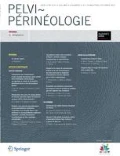Résumé
L’approche thérapeutique médicale de la constipation dépend de la nature des symptômes. Chez les malades dyschésiques, les laxatifs sont moins utiles que le biofeedback et les suppositoires. Les meilleures indications des laxatifs oraux ciblent les malades ayant des selles dures et rares.
Abstract
Medical approaches to treat constipation depend on the nature of complaints. In patients with predominant dyschezia, oral laxatives are useless compared to suppositories and bowel retraining. Best uses of oral laxatives are targeting hard and infrequent stools.
Références
Piche T, Dapoigny M, Bouteloup C, et al (2007) Recommandation pour la pratique clinique dans la prise en charge et le traitement de la constipation chronique de l’adulte. Gastroenterol Clin Biol 31:125–35
Locke GR 3rd, Pemberton JH, Phillips SF (2000) American gastroenterological Association Medical Position Statement: guidelines on constipation. Gastroenterology 119:1761–6
Siproudhis L, Pigot F, Godeberge P, et al (2006) Defecation disorders: a french population survey. Dis Colon Rectum 49:219–27
Rao SS, Seaton K, Miller M, et al (2007) Randomized controlled trial of biofeedback, sham feedback, and standard therapy for dyssynergic defecation. Clin Gastroenterol Hepatol 5:331–8
Farid M, El Monem HA, Omar W, et al (2009) Comparative study between biofeedback retraining and botulinum neurotoxin in the treatment of anismus patients. Int J Colorectal Dis 24:115–20
Maria G, Cadeddu F, Brandara F, et al (2006) Experience with type A botulinum toxin for treatment of outlet-type constipation. Am J Gastroenterol 101:2570–5
Chiarioni G, Whitehead WE, Pezza V, et al (2006) Biofeedback is superior to laxatives for normal transit constipation due to pelvic floor dyssynergie. Gastroenterology 130:657–64
Chiarioni G, Salandini L, Whitehead WE (2005) Biofeedback benefits only patients with outlet dysfunction, not patients with isolated slow transit constipation. Gastroenterology 129:86–97
Jones MP, Talley N, Nuyts G, Dubois D (2002) Lack of objective efficacy of laxatives in chronic constipation. Dig Dis Sci 47:2222–30
Author information
Authors and Affiliations
Corresponding author
Rights and permissions
About this article
Cite this article
Siproudhis, L., Eléouet, M. & Kerdraon, J. Traitements médicamenteux de la constipation. Pelv Perineol 5, 267–269 (2010). https://doi.org/10.1007/s11608-010-0344-8
Received:
Accepted:
Published:
Issue Date:
DOI: https://doi.org/10.1007/s11608-010-0344-8

